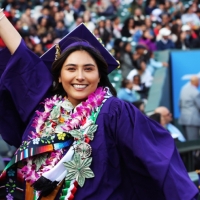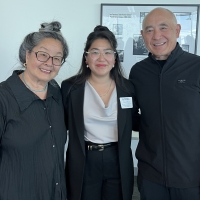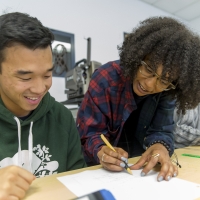After more than 20 years as a faculty member in the Department of Biology, Carmen Domingo, Ph.D. was appointed Dean of the College of Science and Engineering in March 2019. She is the first female to hold the office in the college’s history. Dean Domingo is part of a select group: Only 3% of higher education administrators in the U.S. are Hispanic/Latino, according to a 2017 report by the College and University Professional Association for Human Resources. University Development recently talked with Dean Domingo about her vision, priorities, and goals as dean.
University Development: What makes the College of Science and Engineering (CoSE) at San Francisco State University unique?
Dean Domingo: Our college focuses on the ways that science can improve the human experience and address our society’s inequities. CoSE students enter our programs with diverse experiences: immigrant backgrounds, socio-economic conditions, and many different cultural and ethnic perspectives. By building on the unique assets that they bring to the classroom, we create a learning environment that applies a social justice framework to science – this makes us unique.
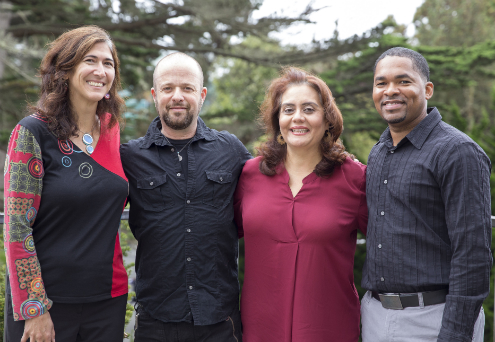
In 2014, then Professor of Biology Carmen Domingo (left) joined with colleagues in developing SF Build (Building Infrastructure Leading to Diversity), a project funded by the National Institute for Health (NIH). (Left to right from Dean Domingo) Professor of Psychology Avi Ben-Zeev, Professor of Biology and Lead Investigator for SF BUILD Leticia Márquez-Magaña, and Associate Professor of Chemistry/Biochemistry Teaster Baird Jr. (Not pictured is Associate Professor of Geography & Environment Tendai Chitewere)
We have a strong record of developing research programs that are accessible to all students, regardless of their starting point, and raising them to a level where they are very competitive for entry into top Ph.D. programs and careers in the sciences and engineering. We are nationally known for this. For over twenty years we have been awarded funding by the National Institute of Health and the National Science Foundation because of our track record in helping diverse students enter prestigious Ph.D. programs. In addition to these student training grants, our faculty have consistently garnered government grants for their research. In fact, this past year (2019/20) faculty in our college have been awarded 60 grants totaling $20.3M. These grants are highly competitive, you typically have to be in the top 10 percentile to be awarded funding. So the fact that our faculty receive such a large number of grants demonstrates the caliber of their research.
Currently, our engineering and computer science programs remain open to all students. This is unique as most engineering and computer science programs in California are impacted. Impaction creates barriers to access because often privileged students who have benefitted from elite high schools, extra-curricular programs, and other resources are favored. We want to make sure that our programs are accessible to everyone, especially local students so that they don't have to relocate to gain access to training in these fields.
“We have a strong record of developing research programs that are accessible to all students, regardless of their starting point, and raising them to a level where they are very competitive for entry into top Ph.D. programs and careers in the sciences and engineering.”
How have the coronavirus pandemic and the resulting changes shifted your priorities for the college?
Dean Domingo: My goal is for the college to provide high-quality remote or hybrid (remote/on-campus) courses to our students. Our faculty have invested significant time and energy in mastering new approaches to engage students through this new form of instruction. I want to make sure that we are attracting and retaining our students and that we are helping them to acquire the necessary skills and competencies to be successful when they graduate from our programs. I am also working with individuals throughout the campus to ensure that we can continue with some research activities while complying with all safety regulations.
How does the $10.5M grant receive last February from the Genentech foundation help the college approach key challenges?
Dean Domingo: Genentech is the first major research company that has recognized our role in preparing the scientific workforce. We've had a relationship with Genentech for quite a while, but their foundation’s recent investment in support of students from freshman to the master's level is transformative. It's sending a message to our students “We believe in you, we've got a path for you, we're going to support you, we recognize the economic challenges that you have, and we want to help you succeed.” And that's such a strong message.
Each year, the Genentech Foundation grant will support over 100 students across our college. Students majoring in biology, chemistry, engineering, computer science, and data science can be awarded scholarships through this grant. I'm also hoping that it will attract other companies to become donors and invest in our students – we have over 7,000 students majoring in science and engineering, and many more could benefit from similar support.
One of the key indicators for retention in the sciences is that the students have a strong sense of belonging, that they feel valued by their colleagues and supervisors, and that they have the skills to be successful in that field. The best way to achieve that is for students to receive scholarships that allow them to participate in hands-on research. Having an opportunity to put into practice what they have learned in the classroom increases retention in the sciences.
Many of our students come from homes where their parents have made significant sacrifices so that their children could attend college, and many of our students are the first in their families to pursue a higher degree. And that path can be incredibly challenging. When a student can conduct research because they’ve been awarded a scholarship, it's a strong message that they have the talent to be successful in science and that the community and University support them in that.
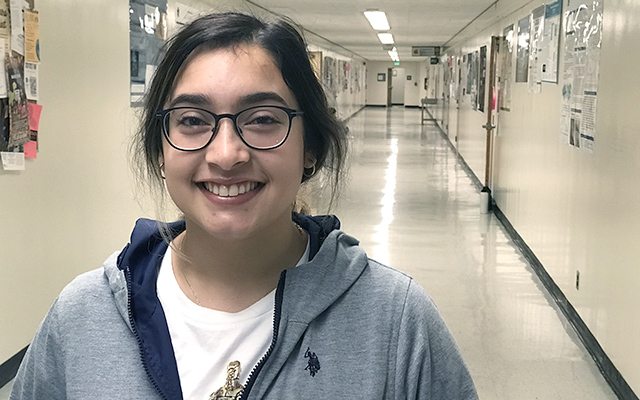
Receiving a Genentech Foundation scholarship allowed Karolina Maytorena to quit a job in the catering business and devote more time to her biology studies and research in CoSE
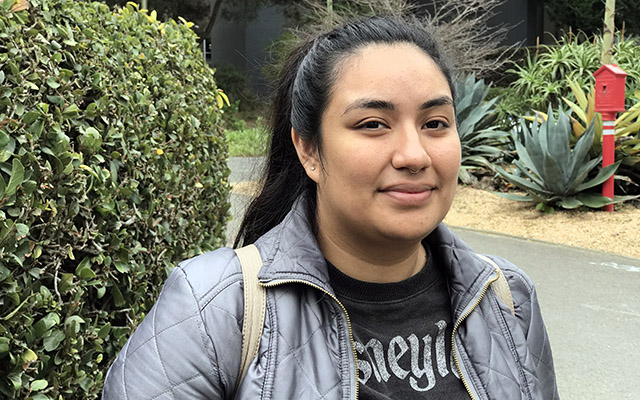
Ana Rodriguez, a CoSE biology senior was able to quit her job in a restaurant after receiving a Genentech Foundation scholarship. "I spend my entire day on campus now, participating in the program. I do research here, I teach physics to students who need support, and I'm part of the community"
What changes have you seen in your students once they work in labs? It provides hands-on professional experience, but what else does it provide?
Dean Domingo: If you're in a classroom learning about science, you're not actually doing science. When students enter a research group they can put into practice some of the things that they learned in class. They get a new understanding of what those concepts mean and also start to see themselves as part of the scientific community. By participating in a research lab, students can feel the excitement of conducting a novel experiment and being the first to make a discovery – that is a very satisfying experience.
If there is funding, students can also have the opportunity to travel and present their work at a scientific conference and learn how to put their novel data together in a poster presentation or a publication. Oftentimes they are one of the only students of color at these scientific conferences. So, not only are they preparing themselves to enter a space that isn't always that welcoming, but they are building their confidence and learning how to articulate their scientific discovery to other scientists. This is a powerful experience.
What do you hope for in terms of CoSE’s effect on the Bay Area's workforce?
Dean Domingo: For California to stay at the forefront of science and technology, we need a workforce that has the specialized skills necessary for our industries. The only way to achieve this is to partner with the California State University (CSU) system. San Francisco State is near the most important metropolis of technology in the world, and we want to make sure that we're partnering with industry leaders to provide the necessary preparation to allow our students to excel at these jobs.
Through these collaborative efforts, we hope that local companies will be inspired to hire our students. By doing so, they not only build a talented and diverse workforce, but they also invest in the diverse communities that these students come from. There are many communities of color in the Bay Area that have been left behind by the tech boom, and students from those communities are seeking ways to economically advance themselves and their families by training in sciences. The best way that Bay Area industries can grow while positively impacting the region is by investing in our local colleges to ensure that our diverse students receive the training necessary to support the workforce needs of the future.
There are so many studies that show that when you bring diversity to the table, the solutions are much more creative. However, the tech industry continues to lack diversity. This is leading to serious troubles. For example, artificial intelligence strategies have left out women and underrepresented minorities, resulting in flawed products. For instance – facial recognition software that can't distinguish one African American face from another, or programming based on biased data. There's real blindness when you have an industry that only represents a certain segment of society. That blindness will catch up because the products they produce will only be tailored to a sub-population.
I see this, particularly in the context of being Latina in the state of California, where the new majority is Latinx. And yet I feel quite alone in the field of science and technology. There are so few Latinx people involved in the profession that the products and strategies are consequently not inclusive, and at worst can negatively impact the vast majority of people in California.
What other areas of the college you would like to see supported through partnerships and investment?
Dean Domingo: I would like to increase the support for our engineering programs. The School of Engineering has grown phenomenally over the last decade and currently serves over 1,500 students. The School currently resides in the oldest science building and is in great need of a new modern building and facilities. Fortunately, the Chancellor’s Office has approved the construction of a new science and engineering building. The project is scheduled to break ground in the summer of 2021 and will transform our teaching and research spaces in the School of Engineering.
In addition to a new academic building, we are working on creating additional opportunities for the students to participate in internships or apprenticeships. This helps companies get to know our students and see their potential, while also providing a very valuable training experience for them. I would love to see the vast majority of our senior projects sponsored by companies or nonprofits. There are a lot of campuses where the industry will sponsor student projects, and that's exciting because the students get mentored by established leaders. The industry provides the supplies and the mentorship, and then this can help students transition to employment at that company or a similar company. We would also like to invite private companies to partner with us through donating resources and equipment, providing guest lecturers, and mentoring students, all of which can have a huge impact on our students.
How do you think that funding can make the college's strength stronger?
Dean Domingo: Funding can support students by giving them access to the tools needed to succeed in their education. We have students that don't have laptops. In the sciences, not having a personal laptop is a huge barrier, and it makes participating in online classes impossible. Funding can also provide graduate student assistance or student assistance to help with homework assignments and tutoring
With funding, we are also able to replace and modernize outdated lab equipment. If we want students to be prepared for the current workforce, we need our classrooms to have the same technology as their future work environments, so that when they interview and are asked, “Have you used X, Y, and Z equipment?” they can say, “Yes, that was part of my lab activity,” or “ That was in the research lab that I worked in.”
Our infrastructure needs are significant. To effectively teach science, you need modern facilities. This is extremely challenging to achieve in buildings that were constructed in the 50s, 60s, and 70s. For students to come here and see the facilities, they can feel that people haven't invested in them. Despite this situation, our faculty have done a tremendous job training our students. I can only imagine that with our new science building, the college’s accomplishments will multiply at least tenfold.
Private funding is a great complement to federal funding, which tends to be inflexible and typically supports only a small number of students. Moreover, private funding can be focused on more diverse outcomes and not restricted to basic research.
"The best way that Bay Area industries can grow while positively impacting the region is by investing in our local colleges to ensure that our diverse students receive the training necessary to support the workforce needs of the future."
Looking towards the College of Science & Engineering of the future, what are your funding priorities?
Dean Domingo: I would like to see all of the three science buildings modernized and brought up to current standards, not standards from the 70s. I would love to make sure that our students have access to financial assistance that doesn't put them in debt, and I feel that securing external and internal funding to support faculty research and innovation in the classroom is of prime importance. Maintaining that balance between research and teaching is important for our institution.
Finally, I would like to develop stronger ties with our alumni. We have terrific alumni pursuing exciting careers, and we would like to create more opportunities for them to give back and help support the students in our college through strategies such as mentorship opportunities, scholarships, and/or sponsoring student events.
Why do you believe private donors and organizations should invest in the college?
Dean Domingo: Donations to the College of Science of Engineering have a huge impact, dollar for dollar. We have a strong track record of successfully preparing students to enter careers in the sciences and engineering. Our educational practices came from decades of work developing strong programs that are based on an understanding of what it takes to prepare our students for the challenges of entering the workforce. The caliber of instruction by our faculty is stellar. We have several leading pioneers in science education. We also offer unique, innovative curricula that are not available at other institutions, for instance, we were the first to offer a certificate in Ethical Artificial Intelligence.
"Donating to our college transforms the lives of our students and the communities they come from. We serve the underserved, thus by giving to our college, we are helping to bring to fruition the academic goals of students who are often the first in their families to attend college – and they are pursuing a challenging career path in science and technology. Our students can help change the face of the scientific workforce and they will help lead these industries so that they are more responsive, impactful and inclusive to the needs of Californians."
Are plans to build the new science building still in effect? If so, can you talk a bit about what you know will be happening with the design and construction of the building?
Dean Domingo: The plans for the new science and engineering building remain on schedule with construction beginning in the fall of 2021. The 150,000 sq. ft. building will be all-electric and house the School of Engineering and the Chemistry & Biochemistry Department serving over 2000 majors and 1000s of students across the college and campus who will take courses in this new building. The new building aims to create laboratories and learning workspaces that are inspired by new technology that supports the most effective and inclusive instructional environment. The building will also include a large lecture hall, the College Student Success Center, and the Student Enrichment Office, which oversees many of our student scholarship and research opportunities. Another important and innovative element of the building is the new Student Project Maker Space, which will include a machine and welding shop and equipment for students to build and test their prototypes, as well as several student meeting spaces. Using the same tools and techniques that they will encounter in the workplace, students will be able to create and display their projects. Lastly, the office of the CoSE Dean will be located in the new building and it will provide integral support services and a welcoming atmosphere for all students and visitors.
In terms of funding, what do you feel is the best way for donors to help the college thrive in the face of the changes wrought by the coronavirus?
Dean Domingo: One of the best ways that donors can help is to donate to our dean’s fund, which gives us the flexibility to direct funds where we need them in a responsive way. There are also a lot of sponsorship opportunities for donors for our new building, and of course, scholarships are a wonderful way to impact student success directly. The pandemic has hit communities of color particularly hard. Our students, many of whom come from marginalized communities, are really impacted and need financial assistance.
In addition to the building, we need to make investments in new technology, so that all students have everything they need to learn remotely, including computers, software programs, and internet access. We want to make sure that our instructors have all the necessary tools to teach as well, such as drawing tablets, software packages, and home workstations.
Returning to campus under all of the necessary safety conditions will require additional costs that are not budgeted. Finally, we also welcome industry mentors, sponsorship of senior projects, and internship opportunities.


